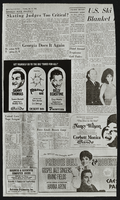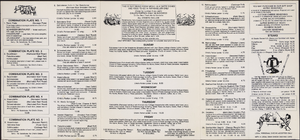Search the Special Collections and Archives Portal
Search Results

Chris Davis, Debbie Davis, and Mynda Smith oral history interview: transcript
Date
Archival Collection
Description
Oral history with Chris Davis, Debbie Davis, and Mynda Smith conducted by Claytee D. White and Barbara Tabach on May 24, 2018 for the Remembering 1 October Oral History Project. In this interview, Debbie and Chris Davis and Mynda Smith discuss the murder of their daughter and sister (respectively), Neysa Davis Tonks, at the Route 91 Harvest Country Music Festival on October 1, 2017. They discuss plans to form Fifty-Eight Loved and Never Forgotten, a foundation to help educate the children of the 58 families affected that night. Neysa, a single mother, left behind three sons, 24, 18, and 15 years of age. The family members recall how they were first alerted to Neysa's death, and having to locate and identify her body at the coroner's office twenty-four hours later. Chris, David, and Mynda reflect on Neysa's life, her work, and legacy. Debbie, Chris, and Mynda believe that "darkness cannot exist in the presence of light. Neysa's light will shine forever."
Text

Aruba Hotel (Thunderbird) Neon Survey document, August 30, 2017
Date
Archival Collection
Description
Site name: Thunderbird Hotel and Casino (Las Vegas, Nev.)
Site address: 1215 S Las Vegas Blvd
Sign owner: 1215 Las Vegas Blvd LLC; C.F. Saticoy, LP
Sign details: The building was constructed in 1964 (Assessor). A vintage postcard from 1967 shows the Lotus Inn Motel and a Sambo's restaurant (VintageVegas.com, 2017). The hotel was renamed the Monte Carlo Inn in 1979, but reverted in the 1980's to the Lotus Inn (VintageVegas, 2017). In 1985, it became the Tally Ho (VintageVegas). Casino owner Bob Stupak renamed it the Thunderbird in 1986 or 1987 (VintageVegas). Stupak proposed building 15-story, $400 million resort hotel called the Titanic on the site, but vocal opposition from residents of the nearby John S. Park neighborhood and a trademark controversy derailed the project (Knightly, 2014). The property was renamed the Aruba Hotel in the early 2000's and became the Thunderbird in 2016 (O'Brien, 2016; VintageVegas). As of April 2017, a 15-story residential building was planned for the site (Carter, 2017).
Sign condition: Condition is 5, excellent. The lower portion of the sign is wrapped in plastic. The exposed upper portion of the sign shows the cabinet, paint and neon all in new condition. All of the neon tubes are intact and functioning.
Sign form: Blade
Sign-specific description: The lower portion of the rectangular metal cabinet is wrapped in black plastic. "THUNDERBIRD" is spelled out in white blocks and red serif letters which run vertically down both sides of the plastic wrap. The upper portion of the cabinet is exposed. The cabinet is topped by a bird shape facing the street. The bird and visible part of the rectangular cabinet are painted forest green. Both sides of the bird are covered in white, blue, pink, yellow and green skeleton neon. Underneath the bird , a horizontal yellow skeleton neon tube is visible.
Sign - type of display: Neon
Sign - media: Steel
Sign environment: Las Vegas Blvd north of the Strip. Property is surrounded by other motels and wedding chapels.
Sign - date of installation: c. 2007
Sign - thematic influences: Tropical, Caribbean and Old Vegas. The parrot on top of the sign closely resembles the symbol of the former Thunderbird hotel on the Las Vegas Strip. The property has used the Thunderbird name intermittently since the 1980's, even when it was the Aruba hotel and the word "THUNDERBIRD" appeared over an "Aruba" sign. (Vegas24Seven, 2012)
Survey - research locations: Assessor's website
Survey - research notes: Carter, J. (2017 April 27). Fights are brewing over a proposed 15-story building downtown. Las Vegas Weekly. Retrieved from https://lasvegasweekly.com/intersection/2017/apr/27/fights-are- brewing-over- proposed-building- downtown/ Knightly, A. M. (2014 August 31). A history of landmarks never built. Las Vegas Review Journal. Retrieved from https://www.reviewjournal.com/news/a-history- of-landmarks- never-built/ O'Brien, J. (2016 January 21). Thunderbird Hotel reopening with former Arts Factory owner at helm. Retrieved from http://vegasseven.com/2016/01/21/thunderbird-hotel- reopens/ http://www.vegas24seven.com/substance-cd- release-sinicle- the-great- circuiting-mechanical- death-a- sinners-confession- at-the- aruba-hotel- saturday-june- 30th/ Vegas24Seven.com. (2012). Substance CD Release, Sinicle, The Great Circuiting, Mechanical Death, A Sinners Confession at The Aruba Hotel Saturday June 30th . Retrieved from Vintage Vegas. (2017 February 16). Archive: Lotus Inn Motel, c. 1967. Retrieved from http://vintagelasvegas.com/post/157345077754/lotus-inn- las-vegas Zeitzer, I. (2007 June 29). On The One, The Aruba Hotel " Las Vegas, NV- 6/22. Retrieved from http://www.jambands.com/reviews/shows/2007/06/29/on-the- one-the- aruba-hotel- las-vegas- nv-6-22#ixzz4rBUwxlkh
Surveyor: Mitchell Cohen
Survey - date completed: 2017-08-30
Sign keywords: Blade; Neon; Steel
Text
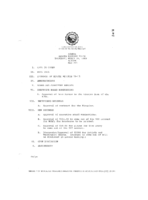
Meeting minutes for Consolidated Student Senate University of Nevada, Las Vegas, March 30, 1989
Date
Archival Collection
Description
Text
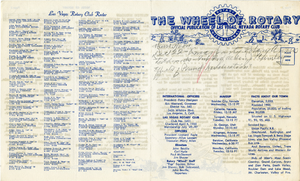
The Wheel of Rotary Las Vegas Rotary Club newsletter, December 1, 1949
Date
Archival Collection
Description
Text

Interview with Bennie Reilley, Sr., May 10, 2004
Date
Archival Collection
Description
Access note: May not quote in any form without written permission from interviewee
Text
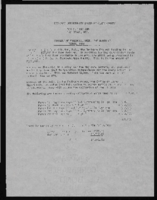
Economic Opportunity Board of Clark County (Nev.) financial and budget reports
Date
Archival Collection
Description
From the Clark County Economic Opportunity Board Records -- Series I. Administrative. This folder contains financial memos and reports of the Clark County Economic Opportunity Board in 1966.
Text

Transcript of interview with Renee Marchant Rampton by Dr. Caryll Batt Dziedziak, September 25, 2015
Date
Archival Collection
Description
Renee Marchant Rampton has often referred to herself as "One of Fifteen." Indeed, growing up in a family of fifteen children, Renee experienced the care of loving parents, the excitement of a bustling household, and the engagement of an active Church; all amidst the strains of a depression era economy. Renee's mother, Beatrice Marchant, provided Renee with a strong role model with which to emulate; a disciplined woman, who rose to the task without hesitation. Beatrice became the family's provider after her husband's debilitating stroke and later served in the Utah Legislature during the 1970s. Renee loved music from an early age. As a young child she found an early job as a piano accompanist for a dance studio. In 1956 she married musician, Roger Rampton, a successful percussionist. They soon settled in Las Vegas, where Roger performed on the Strip and they began raising their four children. It was an exciting period in Las Vegas history as the Strip attracted musicians and
Text

Transcript of interview with Sam Earl by Laura Button, March 9, 1981
Date
Archival Collection
Description
On March 9, 1981, Laura Button interviewed Sam Earl (born 1912 in Virgin, Utah) about his life in Nevada. Also present during the interview is Sam’s wife, Melissa Earl. The three discuss a wide range of topics from the early development of Las Vegas, Sam’s work on the Boulder Dam, the Earls’ early residence in a tent, and the family’s religious participation. The interview also covers gambling, Block 16, the first members of the police force, recreational activities, and the Helldorado parade. Sam also talks about his work as a building contractor, including some of the buildings and casino properties he helped build, and the interview moves to a discussion of the development of the Las Vegas Strip. The interview concludes with Sam’s description of his work as a truck driver and a discussion on welfare benefits.
Text

